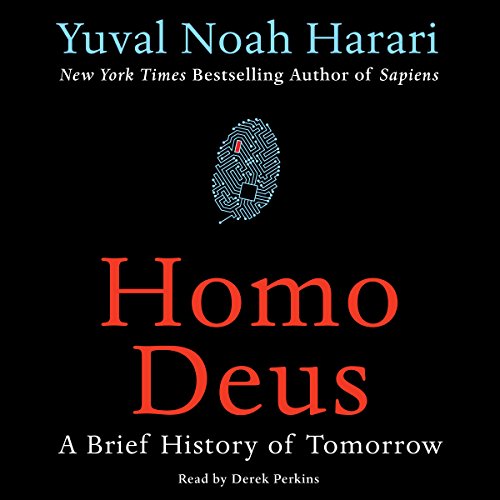
Yuval Noah Harari, author of the critically acclaimed New York Times best seller and international phenomenon Sapiens, returns with an equally original, compelling, and provocative book, turning his focus toward humanity’s future and our quest to upgrade humans into gods.
Over the past century, humankind has managed to do the impossible and rein in famine, plague, and war. This may seem hard to accept, but as Harari explains in his trademark style – thorough yet riveting – famine, plague, and war have been transformed from incomprehensible and uncontrollable forces of nature into manageable challenges. For the first time ever, more people die from eating too much than from eating too little; more people die from old age than from infectious diseases; and more people commit suicide than are killed by soldiers, terrorists, and criminals put together. The average American is 1,000 times more likely to die from binging at McDonalds than from being blown up by Al Qaeda.
What then will replace famine, plague, and war at the top of the human agenda? As the self-made gods of planet Earth, what destinies will we set ourselves, and which quests will we undertake? Homo Deus explores the projects, dreams, and nightmares that will shape the 21st century – from overcoming death to creating artificial life. It asks the fundamental questions: Where do we go from here? And how will we protect this fragile world from our own destructive powers? This is the next stage of evolution. This is Homo Deus.
With the same insight and clarity that made Sapiens an international hit and a New York Times best seller, Harari maps out our future.

Delightfully terrifying! Audience: Readers looking ahead to the future and wondering what the world may look like in 100 years. People interested in all aspects of humanity and the science, psychology, technology and politics behind everything we have done, are doing and will do in the future.
Skip the crass caricature of humanism. Go to Part 3, a disturbing prediction of big-data dystopia. This book is a mixed bag. It has three parts. The first is a review of some of the concepts explored in Harari’s earlier book Sapiens. It discusses such topics as “intersubjective reality”, which is used to relate systems such as money, corporations, and religions. Part 1 is engaging and insightful; it deserves 4/5 stars.
A mix of deft writing, sweeping ideas and incomplete speculation: 3.5 stars Yuval Noah Harari’s “Homo Deus” continues the tradition introduced in his previous book “Sapiens”: clever, clear and humorous writing, intelligent analogies and a remarkable sweep through human history, culture, intellect and technology. In general it is as readable as “Sapiens” but suffers from a few limitations.